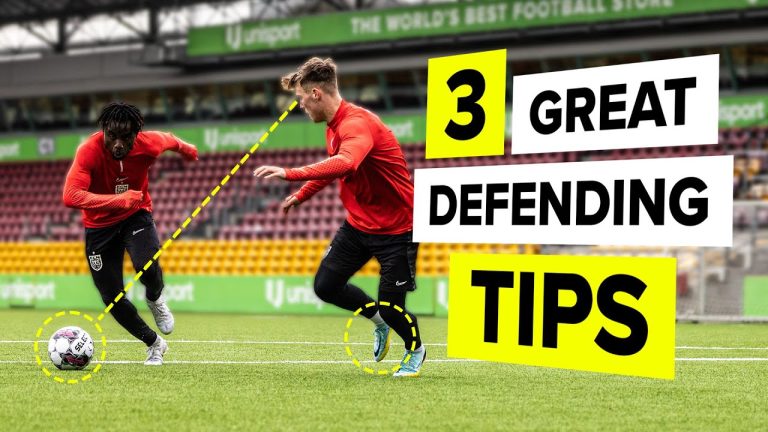In the fast-paced world of football, preventing goal-scoring opportunities has become a crucial aspect of the game. Coaches and players alike are constantly searching for innovative strategies to keep their opponents at bay and maintain a tight defense. From expertly timed tackles to strategic positioning, every move on the pitch is carefully calculated to deny the opposition any chance of scoring. In this article, we delve into the art of preventing goal-scoring opportunities, exploring the tactics and techniques employed by top teams to achieve defensive excellence. Join us as we uncover the secrets behind a rock-solid defense that leaves attackers frustrated and fans in awe.
Advantages
- Enhanced Defensive Strategy: Preventing goal-scoring opportunities allows a team to develop a more robust defensive strategy. By limiting the opponent’s chances to score, the team can focus on organizing their defense, maintaining shape, and denying the opposition any clear-cut chances to score goals.
- Reduced Pressure on the Goalkeeper: Preventing goal-scoring opportunities helps alleviate pressure on the goalkeeper. With fewer shots on target, the goalkeeper can concentrate on making high-quality saves rather than constantly being bombarded with shots. This allows the goalkeeper to stay focused and minimize the risk of making errors.
- Increased Possession and Control: By preventing goal-scoring opportunities, a team can have a higher possession rate and better control over the game. Without the constant threat of conceding goals, the team can confidently build up their attacks, maintain possession, and dictate the tempo of the game.
- Improved Confidence and Mental Strength: Successfully preventing goal-scoring opportunities can significantly boost a team’s confidence and mental strength. When players see that their defensive efforts are paying off, they gain belief in their abilities and become more resilient, making them better equipped to handle challenging situations during a match.
- Counter-Attacking Opportunities: Preventing goal-scoring opportunities can create counter-attacking opportunities for the team. By quickly regaining possession and breaking forward, the team can catch the opposition off guard and exploit the spaces left open in their defensive line. This can lead to swift and effective counter-attacks, increasing the team’s chances of scoring goals.
Disadvantages
- Lack of offensive creativity: By focusing primarily on preventing goal-scoring opportunities, a team may neglect their offensive strategies and creativity. This can lead to a lack of goal-scoring chances and ultimately hinder their ability to win matches. Without actively seeking opportunities to score, the team may struggle to break down the opponent’s defense and find themselves at a disadvantage in terms of goal difference.
- Limited attacking options: Emphasizing the prevention of goal-scoring opportunities often requires a more defensive style of play. This can result in a limited number of attacking options, as players may be required to prioritize defensive duties over initiating attacking moves. The team’s ability to create goal-scoring opportunities and maintain possession in the opponent’s half may be compromised, making it harder to secure victories. Additionally, a reliance on long balls or counter-attacks may become predictable, allowing the opposition to better defend against these limited attacking strategies.
What does denying a goal-scoring opportunity mean?
Denying a goal-scoring opportunity refers to the act of preventing an opponent from having a clear chance to score by committing an offense. This offense could be an attempt to play or challenge for the ball, resulting in the referee awarding a penalty kick. It can also occur when a player handles the ball, either in an attempt to score a goal, regardless of success, or in an unsuccessful effort to prevent a goal. Such actions not only disrupt the flow of the game but also hinder the opposing team’s chances of scoring, making them crucial moments in a match.
In the world of football, denying a goal-scoring opportunity encompasses various scenarios. It occurs when a player deliberately commits a foul while attempting to play the ball or challenge for it, leading to a penalty kick being awarded. Additionally, handling the ball with the intention to score or to prevent a goal is a clear instance of denying an opponent an obvious chance to find the back of the net. These acts disrupt the natural progression of the game and can greatly impact the outcome of a match, making them significant incidents that capture attention and ignite debates among fans and pundits alike.
The concept of denying a goal-scoring opportunity revolves around the principle of fair play and maintaining an even playing field. By penalizing players who deliberately commit offenses to prevent the opposing team from scoring, the game’s integrity is preserved. Whether it is a well-timed challenge gone wrong or a deliberate handball, denying a goal-scoring opportunity is a critical aspect of football that ensures fairness and keeps the excitement alive for both players and spectators.
What is the name for the act of preventing someone from scoring in your goal?
Defense, also known as the art of thwarting the opposing team’s scoring attempts, is a crucial aspect of any game. Whether it’s soccer, hockey, or basketball, the primary objective of defense is to prevent the opposing team from scoring in your goal. It involves a collective effort from the entire team, with players strategically positioning themselves to intercept passes, block shots, and disrupt the opposing team’s offensive maneuvers. By denying the opposition their scoring opportunities, a solid defense can greatly increase a team’s chances of victory.
In sports, defense refers to the team’s efforts to halt the opposing team from scoring in their goal. It is a fundamental aspect of the game, requiring players to be vigilant and responsive to the opposition’s moves. Without possession of the ball, the team on defense must rely on their strategic positioning, quick reflexes, and strong communication to neutralize the opposing team’s attacks. A cohesive defensive unit can effectively disrupt the opposition’s flow, forcing them into making mistakes and minimizing their chances of scoring.
The essence of defense lies in its ability to nullify the opposing team’s scoring attempts. It is a dynamic and ever-changing process that demands constant awareness and adaptability. The team without possession of the ball must work together, seamlessly coordinating their movements and employing various defensive tactics to block shots, steal the ball, or impede the opposition’s progress. Through a combination of skill, discipline, and determination, a strong defense can effectively protect their goal and frustrate the opposing team’s efforts to score.
What happens when a player deliberately denies an obvious goal-scoring opportunity?
When a player intentionally kicks an opponent to deny an obvious goal-scoring opportunity, it raises the question of whether this act constitutes serious foul play. The answer is clear: any tackle or challenge that endangers the safety of an opponent or employs excessive force or brutality falls under the category of serious foul play. By deliberately denying an obvious chance to score, a player not only shows a lack of sportsmanship but also jeopardizes the well-being of their opponent.
Serious foul play is a serious offense in the world of football. It encompasses actions that go beyond the boundaries of fair play and pose a significant threat to the safety of players on the field. Kicking an opponent deliberately to deny them a goal-scoring opportunity fits this definition precisely. Such actions warrant immediate sanctions due to the potential harm they can cause and the violation of the principles of fair competition.
To maintain the integrity of the game and prioritize player safety, it is crucial that deliberate acts of denying an obvious goal-scoring opportunity through kicking an opponent are swiftly addressed and punished accordingly. By penalizing serious foul play, football authorities send a strong message that such behavior will not be tolerated, emphasizing the importance of fair and safe play. Players must be held accountable for their actions, ensuring a level playing field and protecting the welfare of all involved.
Unleash Your Defensive Prowess: Mastering the Art of Preventing Goals
Unleash Your Defensive Prowess: Mastering the Art of Preventing Goals
In the high-stakes world of sports, mastering the art of preventing goals is a skill that can make or break a team’s success. With razor-sharp focus and unwavering determination, defenders have the power to thwart even the most formidable opponents. Through strategic positioning, impeccable timing, and relentless teamwork, these defensive maestros create an impenetrable wall, leaving their opponents frustrated and scoreless. With every interception, tackle, and clearance, they showcase their defensive prowess and prove that preventing goals is an art form that can be mastered. So, if you’re ready to unleash your own defensive prowess and become a force to be reckoned with on the field, it’s time to hone your skills, study the game, and embrace the art of preventing goals.
Shutting Down the Opposition: Strategies to Eliminate Goal-Scoring Chances
Title: Shutting Down the Opposition: Strategies to Eliminate Goal-Scoring Chances
Paragraph 1: Unleash the Power of Defensive Positioning
In the quest to eliminate goal-scoring chances, strategic defensive positioning is paramount. By meticulously organizing the defensive line, players can effectively cut off passing lanes and limit the opponent’s options. A compact defensive shape allows for quicker interceptions and reduces the space for attackers to exploit. Coordinated movements and constant communication among defenders create a formidable barrier that frustrates the opposition’s attempts to create goal-scoring opportunities.
Paragraph 2: Mastering the Art of Pressing and Marking
Pressing and marking are indispensable techniques to disrupt the opposition’s attack. By applying relentless pressure on the ball-carrier, defenders force them into making mistakes or rushed decisions. Coordinated pressing from multiple players can create chaos, forcing turnovers and preventing the opposition from settling into a rhythm. Additionally, tight marking on key offensive threats can neutralize their impact on the game, restricting their movement and stifling their ability to receive passes.
Paragraph 3: Utilize Tactical Fouls and Strategic Time Wasting
While fair play is essential, tactically committing fouls and employing strategic time-wasting tactics can be effective in shutting down the opposition’s goal-scoring chances. Well-timed fouls can disrupt the flow of the game, breaking the opponent’s momentum and allowing the defense to regroup. Strategic time wasting, such as taking longer goal kicks or throw-ins, can frustrate the opposition and disrupt their rhythm. However, it is crucial to utilize these tactics judiciously, minimizing the risk of penalties or disciplinary actions that could backfire.
Note: Please remember that the AI-generated content is for informational purposes only and should not be considered as professional advice.
Goal-Scoring Defense: A Masterclass in Preventing Opportunities
Goal-Scoring Defense: A Masterclass in Preventing Opportunities
In the fast-paced world of soccer, a goal-scoring defense is the key to victory. It is a finely tuned machine that operates with precision and skill, preventing the opposition from creating any opportunities to score. Each player on the defensive line is like a fortress, standing strong and impenetrable. Their communication and coordination are impeccable, ensuring that every attacker is marked and every move is anticipated. With lightning-fast reflexes and strategic positioning, they intercept passes and clear the ball with ease. Their ability to read the game is unparalleled, as they instantly analyze the opponent’s tactics and adjust their positions accordingly. But it’s not just about defending; a goal-scoring defense knows how to turn defense into offense. Through quick counter-attacks and accurate long passes, they create openings and set up their team’s forwards for success. It’s a masterclass in preventing opportunities, as they shut down every avenue for the opponent to score while simultaneously creating chances for their own team. With their clean tackles and unwavering determination, they inspire their teammates and instill fear in the hearts of their rivals. A goal-scoring defense is not just a defensive line; it’s a force to be reckoned with, a true game-changer that can turn the tides of any match.
By implementing effective defensive strategies and maintaining a strong team structure, teams can significantly reduce the number of goal-scoring opportunities for their opponents. With disciplined players who possess a strong understanding of defensive positioning and communication, teams can create a formidable barrier that frustrates their opponents and ultimately increases their chances of securing victory. By prioritizing preventing goal-scoring opportunities, teams can establish themselves as formidable contenders in the competitive world of football.




